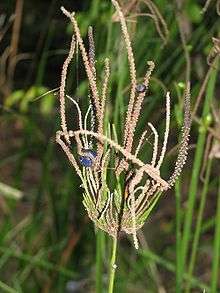Gymnostachys
Gymnostachys is a monotypic genus, of the monocotyledon plant family Araceae.
| Gymnostachys | |
|---|---|
 | |
| Scientific classification | |
| Kingdom: | Plantae |
| Clade: | Tracheophytes |
| Clade: | Angiosperms |
| Clade: | Monocots |
| Order: | Alismatales |
| Family: | Araceae |
| Subfamily: | Gymnostachydoideae Bogner & Nicolson |
| Genus: | Gymnostachys R.Br. |
| Species: | G. anceps |
| Binomial name | |
| Gymnostachys anceps | |
| Synonyms[1] | |
| |
The sole known species Gymnostachys anceps, commonly named settler's twine or boorgay, grows naturally in rainforests and humid Eucalypt forests of eastern New South Wales and eastern Queensland, Australia.[2][3]
Gymnostachys is kept to its own subfamily Gymnostachydoideae due to its unique characteristics that include an unusually structured flowering shoot and linear leaves with parallel venation.
References
- "Gymnostachys%". Australian Plant Name Index (APNI), Integrated Botanical Information System (IBIS) database (listing by % wildcard matching of all taxa relevant to Australia). Centre for Plant Biodiversity Research, Australian Government. Retrieved 20 November 2013.
- A. Hay. "New South Wales Flora Online: Gymnostachys anceps". Royal Botanic Gardens & Domain Trust, Sydney, Australia.
- Hyland, B. P. M.; Whiffin, T.; Zich, F. A.; et al. (December 2010). "Factsheet – Gymnostachys anceps". Australian Tropical Rainforest Plants (6.1, online version RFK 6.1 ed.). Cairns, Australia: Commonwealth Scientific and Industrial Research Organisation (CSIRO), through its Division of Plant Industry; the Centre for Australian National Biodiversity Research; the Australian Tropical Herbarium, James Cook University. Retrieved 20 November 2013.
- Mayo, S.J., Bogner, J., and Boyce, J.C. (1998) The genera of Araceae project, Acta Botanica Yunnanica.
- Bown, Deni (2000). Aroids: Plants of the Arum Family [ILLUSTRATED]. Timber Press. ISBN 0-88192-485-7
This article is issued from Wikipedia. The text is licensed under Creative Commons - Attribution - Sharealike. Additional terms may apply for the media files.